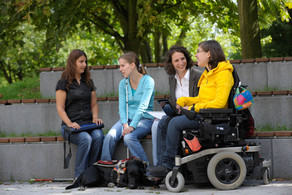Vocational rehabilitation in times of multiple challenges
![[Translate to English:] [Translate to English:]](/storages/ait-reha/_processed_/b/1/csm_Christoph_Masterarbeit_Meldung_6ef70aea4c.png)
In this publication, vocational training centers (BFWs) as locations for vocational rehabilitation in Germany are examined in detail in their confrontation with multiple challenges. In the individual facilities in Germany, services for participation in working life have been provided for decades with the aim of occupational reintegration, which is often achieved through retraining by means of recognized training. However, the state of research illuminated by an extensive and systematic literature review reveals that vocational rehabilitation as a research topic is a niche area. Nevertheless, there are two relevant research desiderata, one relating to the exploration of the incomplete data situation in this field and the other to how institutions deal with the challenges identified. For this reason, a mixed-methods design was constructed in which the data situation of the three major funding agencies (Federal Employment Agency, German Pension Insurance and German Statutory Accident Insurance) with regard to occupational rehabilitation measures in BFWs is first examined in a quantitative part, before the BFW Dortmund is included as an exemplary institution. The subsequent qualitative contribution comprises interviews with various status groups in the BFW system. The theoretical framework is based on the approach of neoliberalism. In relation to the results of the work, challenges can be identified on four different levels. From an institutional perspective, due to the coronavirus pandemic, digital services had to be created in the facilities in the short term, which continue to be used in individual cases even after the end of most protective and hygiene measures. Furthermore, the target group is diversifying on an individual level, especially against the backdrop of a significant increase in mental illness. In addition, the BFWs are faced with the financial problem of having to react to falling numbers of referrals, while socio-political demands on the facilities remain. Due to the shortage of skilled workers, it is becoming increasingly difficult to reconcile the role of rehabilitation service provider and commercial enterprise against the backdrop of the balancing processes being sought. Possible solutions in this respect will be discussed in the concluding discussion.




